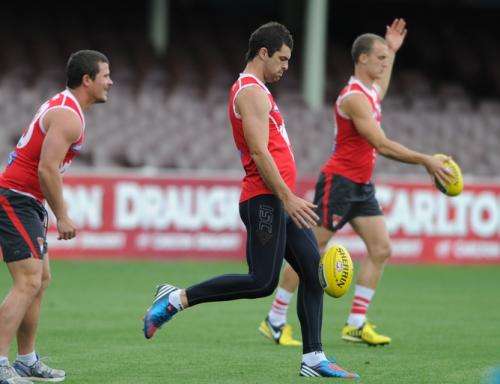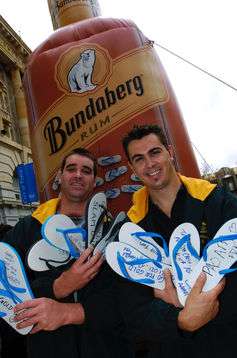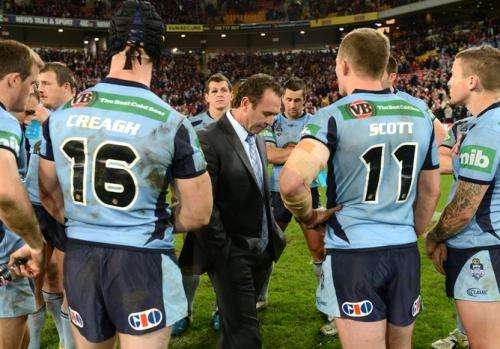'As a matter of fact, I've got it now': Alcohol advertising and sport

Sport is generally a healthy activity that transmits important societal values, such as fairness, perseverance, and teamwork. Unfortunately, it's also the primary vehicle for marketing alcohol to the general population.
At its best, sport can provide participants and fans with a sense of identity, pride and self-esteem. But a visitor to Australian shores would be forgiven for thinking that sport is a subsidiary of the alcohol, fast food and gambling industries.
Indeed, the majority of alcohol advertising and sponsorship both in terms of frequency and time of advertising, and in alcohol marketing expenditure, occurs in and around sport. In 2009, two of the world's largest alcohol producers, Anheuser-Busch InBev and SABMiller, spent approximately $350 million and $212 million, respectively, on television advertising during US sporting events alone. We are unable to obtain figures for Australia.
There are several reasons for the alcohol industry using sport for the promotion of alcohol consumption.
First, placement of alcohol sponsorship and advertising in large televised sporting events allows the alcohol industry to bypass regulations prohibiting alcohol advertising during times when large proportions of children may be watching television.
Victoria Bitter's sponsorship of Australian cricket, for instance, means that children are exposed to alcohol advertising from ten in the morning to the end of play. And it's difficult to miss the alcohol brands on signage and boarding around Australian sport stadiums. Or, the VB signs either side of the electronic score board each time a third umpire decision is needed.
Another feature that attracts the alcohol industry is sport's ability to evoke strong emotion and social identification. Products presented within these sporting contexts are more likely to be remembered, liked and chosen.
Pairing a healthy activity, such as sport, with an otherwise unhealthy product, such as alcohol or fast food, makes that product seem less unhealthy and more acceptable and normal. Many of us will remember tobacco advertising in sport but I suspect that even smokers wouldn't welcome that back.
Simply put, alcohol advertising and sponsorship in sport works in terms of increasing sales, and of course, alcohol consumption.
Reviews of research on the association between exposure to alcohol advertising and subsequent drinking intentions and behaviours shows that exposure to, and/or recall of, alcohol advertising and sponsorship by children and adolescents predicts their future drinking expectancies, norms, drinking intentions, and hazardous drinking behaviours.

A study from the United States also found that ownership of alcohol-branded merchandise by children and adolescents (such as football shirts and sport caps) was associated with their early initiation of drinking. Similarly, alcohol industry sponsorship of sportspeople has been found to be associated with more hazardous drinking levels among Australian, New Zealand and UK sportspeople.
Beyond these outcomes, alcohol industry advertising and sponsorship in sport and other settings, creates a culture where children perceive alcohol consumption as a normal everyday part of life. And they see it as something associated with sporting success or indeed, being Australian.

Given the known relationship between alcohol advertising and youth drinking, researchers who assess drinking norms, peer influence and parental influence as predictors of young people's drinking, are in effect measuring people's exposure to alcohol advertising and sponsorship.
Most of us didn't grow up in a culture void of alcohol advertising and sponsorship, which makes it difficult for us to imagine sport without them. But given the high rates of hazardous drinking and associated problems in young people (violence, suicide, motor accidents), we probably don't need to be giving them more encouragement to drink. The same was true for tobacco advertising and sponsorship in sport and few would now question the wisdom of banning such promotion.

The alcohol industry's self-regulation of advertising has been shown to not work, and stronger regulation is clearly needed. Effective action is possible.
France has had a complete ban on alcohol advertising and sponsorship since 1991. Sport has not suffered and alcohol consumption has decreased in the past 20-odd years. Indeed, France even hosted the 1998 FIFA World Cup with this ban in place and enforced.
Similarly, Norway and Turkey have strong restrictions on alcohol advertising in sport, and South Africa is currently drafting a bill to ban all alcohol advertising and sponsorship in sport. It would be simple to do the same in Australia.
Naturally, "big sport" (AFL, NRL and cricket) and the alcohol industry will object to the removal of alcohol advertising and sponsorship, citing that grassroots sport will suffer. But the experience of nations where bans have been imposed suggests otherwise, such as Norway and France.
The Australian National Preventative Health Agency has successfully negotiated the removal of alcohol sponsorship from most of Australia's major sporting codes (Football Federation of Australia, Netball Australia, Swimming Australia, Basketball Australia, Cycling Australia, Hockey Australia). But AFL, rugby league and union and cricket are resisting change.
Sport in Australia could still be funded by the alcohol, tobacco, and fast-food industries, but through the ring-fencing of a small portion of the tax gathered from their sales. This would allow sport to thrive without the downside of also promoting unhealthy products to our children.
This story is published courtesy of The Conversation (under Creative Commons-Attribution/No derivatives).















